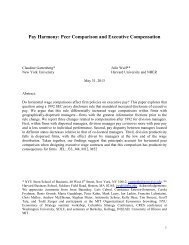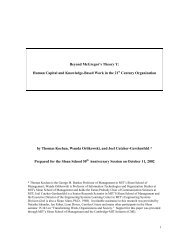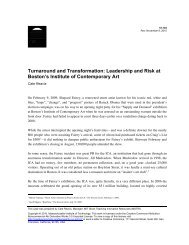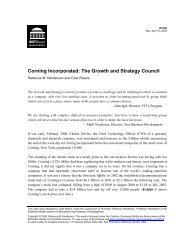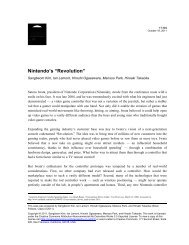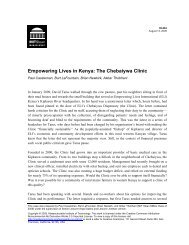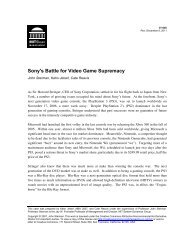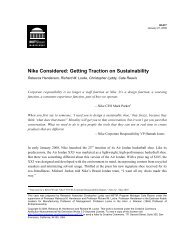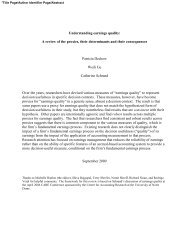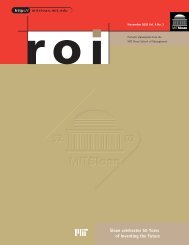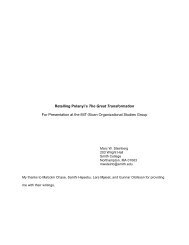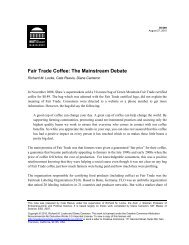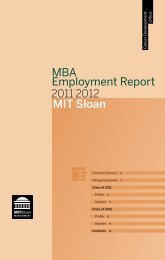E-commerce at Yunnan Lucky Air - MIT Sloan School of Management
E-commerce at Yunnan Lucky Air - MIT Sloan School of Management
E-commerce at Yunnan Lucky Air - MIT Sloan School of Management
You also want an ePaper? Increase the reach of your titles
YUMPU automatically turns print PDFs into web optimized ePapers that Google loves.
E-COMMERCE AT YUNNAN LUCKY AIR<br />
Inaki Berenguer, Cai Shijun, Li Liang, Liu Jing and Ningya Wang<br />
Ctrip, eLong, and their competitors <strong>of</strong>fered online portals, but their internal oper<strong>at</strong>ions depended on<br />
call centers. Due to the less established credit card payment system and different rules among banks,<br />
most <strong>of</strong> the credit card valid<strong>at</strong>ions were done manually through the call centers. According to eLong,<br />
only 20% <strong>of</strong> customers paid online, and many <strong>of</strong> those still called afterwards to confirm their payment<br />
st<strong>at</strong>us. Meanwhile no autom<strong>at</strong>ic online purchasing system had been cre<strong>at</strong>ed to cut across multiple<br />
airlines, as this would have required a tremendous level <strong>of</strong> coordin<strong>at</strong>ion among airlines, banks, and<br />
TravelSky.<br />
Almost all airlines in China had begun to <strong>of</strong>fer online booking service on their websites. The quality<br />
<strong>of</strong> the service was generally considered less than s<strong>at</strong>isfactory. Online travel sites such as Ctrip and<br />
eLong <strong>of</strong>fered better online experiences and provided a large selection <strong>of</strong> airlines and hotels. Many<br />
people visited these websites to research travel inform<strong>at</strong>ion, although only 10% <strong>of</strong> them actually<br />
booked online.<br />
<strong>Lucky</strong> <strong>Air</strong> sold about 80% <strong>of</strong> its tickets through agents, paying them a 2% commission, and the rest<br />
through its own website. Among tickets sold on its website, 95% were bought by reseller agents who<br />
turned around and resold the tickets to individual consumers. Only 1% <strong>of</strong> the total tickets were<br />
purchased directly by consumers on luckyair.net.<br />
<strong>Lucky</strong>air.net<br />
One <strong>of</strong> <strong>Lucky</strong> <strong>Air</strong>’s strengths was its IT oper<strong>at</strong>ions. It depended on its parent company, Hainan<br />
<strong>Air</strong>lines, for IT support and spent a mere 0.15% <strong>of</strong> its own net income on IT investment. Its website,<br />
luckyair.net, was the first in the industry to enable online credit card verific<strong>at</strong>ion and cre<strong>at</strong>e an online<br />
community for its passengers. <strong>Lucky</strong> <strong>Air</strong> hoped to reach more customers directly via its website, and<br />
build more brand recognition and a loyal customer base.<br />
<strong>Lucky</strong>air.net <strong>of</strong>fered a menu <strong>of</strong> services. Customers could buy and refund tickets online, paying 5%<br />
to 20% less than anywhere else. They could also valid<strong>at</strong>e their tickets online, a service formerly<br />
available only through TravelSky, and obtain flight inform<strong>at</strong>ion, news upd<strong>at</strong>es online, and detailed<br />
descriptions <strong>of</strong> travel destin<strong>at</strong>ions inside and outside <strong>Yunnan</strong>. The site provided a home for a <strong>Lucky</strong><br />
<strong>Air</strong> community, allowing customers to cre<strong>at</strong>e blogs and share experiences, although inform<strong>at</strong>ion on<br />
why they chose or enjoyed <strong>Lucky</strong> <strong>Air</strong> was lacking. <strong>Lucky</strong> <strong>Air</strong> <strong>of</strong>fered bonus points for returning<br />
customers, which they could exchange for gifts. <strong>Lucky</strong> <strong>Air</strong>’s flights were searchable by most search<br />
engines, such as Google and Baidu, and Ctrip and eLong fe<strong>at</strong>ured some <strong>Lucky</strong> <strong>Air</strong> flights on their<br />
websites. Unlike most airlines and online travel agents, <strong>Lucky</strong> <strong>Air</strong> did not have a call center back-end<br />
oper<strong>at</strong>ion. All online transactions – searching, booking, paying, and valid<strong>at</strong>ing – were online. To<br />
<strong>Lucky</strong> <strong>Air</strong>’s executive team, the website appeared to be a promising way to emul<strong>at</strong>e overseas airlines’<br />
best practices and keep ahead <strong>of</strong> the Chinese competition.<br />
August 11, 2008 6



